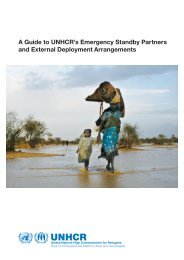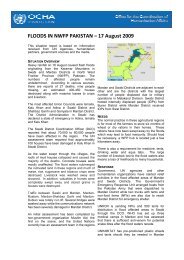Women, Girls, Boys and men - HumanitarianInfo.org
Women, Girls, Boys and men - HumanitarianInfo.org
Women, Girls, Boys and men - HumanitarianInfo.org
Create successful ePaper yourself
Turn your PDF publications into a flip-book with our unique Google optimized e-Paper software.
I A s c g e n D e r h A n D b o o k<br />
CHECklIST To ASSESS EFForTS To EnSurE EquAl PArTICIPATIon<br />
The checklist below is derived from the activities section in this chapter <strong>and</strong> provides a useful tool to remind sector actors of<br />
key issues to ensure gender equality programming. In addition, project staff should develop context-specific indicators to<br />
measure progress in gender equality programming. Refer to the sample indicators in the Basics Chapter.<br />
checklIst to Assess eFForts to ensure equAl pArtIcIpAtIon<br />
1. <strong>Wo<strong>men</strong></strong> <strong>and</strong> <strong>men</strong> of all ages affected by humanitarian emergencies receive information on the programme <strong>and</strong> are given the opportunity<br />
to com<strong>men</strong>t during all stages of the programme cycle.<br />
2. Balanced representation by wo<strong>men</strong> <strong>and</strong> <strong>men</strong> in all groups is achieved.<br />
3. programmes are based on the willing cooperation of the affected population.<br />
4. special fora exist for the participation of wo<strong>men</strong> <strong>and</strong> youth.<br />
5. programme objectives reflect the needs, concerns <strong>and</strong> values of all seg<strong>men</strong>ts of the population affected by humanitarian emergencies.<br />
6. assess<strong>men</strong>t results are communicated to all concerned <strong>org</strong>anizations <strong>and</strong> individuals.<br />
7. mechanisms are established to allow all seg<strong>men</strong>ts of the affected population to provide input <strong>and</strong> feedback on the programme.<br />
8. age- <strong>and</strong> sex-specific outreach is established for individuals who are marginalized, for example the homebound, disabled or others who<br />
may have problems accessing services.<br />
9. programming is designed to maximize the use of local skills <strong>and</strong> capacities, including the skills <strong>and</strong> capacities of wo<strong>men</strong> <strong>and</strong> youth.<br />
10. Gender-sensitive programmes are designed to build on local capacity <strong>and</strong> do not undermine wo<strong>men</strong>’s, girls’, boys’ <strong>and</strong> <strong>men</strong>’s own coping<br />
or other strategies.<br />
11. programmes support, build on <strong>and</strong>/or comple<strong>men</strong>t gender responsiveness of existing services <strong>and</strong> local institutional structures.<br />
12. local <strong>and</strong> national govern<strong>men</strong>tal <strong>org</strong>anizations are consulted in the longer-term design of gender-sensitive programmes.<br />
13. trainings <strong>and</strong> workshops are undertaken with the inclusion of representatives from the community <strong>and</strong> local groups <strong>and</strong> networks such<br />
as youth groups, wo<strong>men</strong>’s <strong>org</strong>anizations <strong>and</strong> other collectives.<br />
rESourCES<br />
1. Active Learning Network for Accountability <strong>and</strong> Performance in Humanitarian Action (ALNAP). ALNAP Global Study on<br />
Consultation <strong>and</strong> Participation of Disaster-Affected Populations: Practitioners’ H<strong>and</strong>book. London, 2003.<br />
http://www.odi.<strong>org</strong>.uk/alnap/publications/participation_study.htm<br />
2. The Sphere Project: Humanitarian Charter <strong>and</strong> Minimum St<strong>and</strong>ards in Disaster Response. The Sphere H<strong>and</strong>book: 2004<br />
Revised Version. Geneva, 2004. http://www.sphereproject.<strong>org</strong>/content/view/27/84/lang,English/<br />
3. United Nations High Commissioner for Refugees. The UNHCR Tool for Participatory Assess<strong>men</strong>t in Operations. Geneva,<br />
2005. http://www.unhcr.<strong>org</strong>/publ/PUBL/450e963f2.html<br />
4. World Food Programme. Participatory Techniques <strong>and</strong> Tools — A WFP Guide. Rome, 2001.<br />
G e n d e R A n d PA R T I C I PAT I o n I n H u m A n I T A R I A n A C T I o n<br />
PARTiciPATiOn











